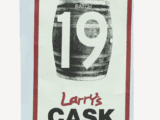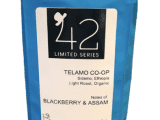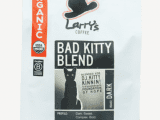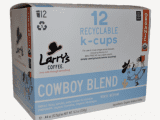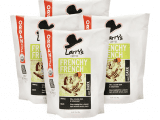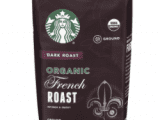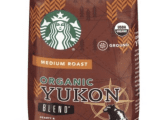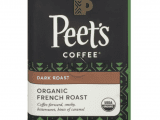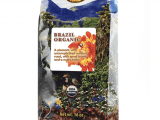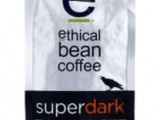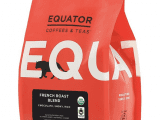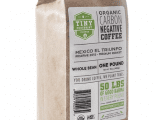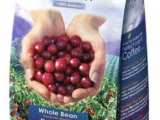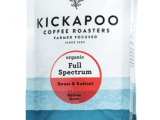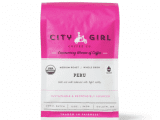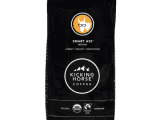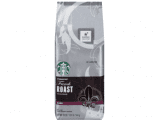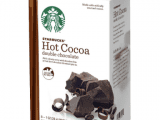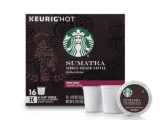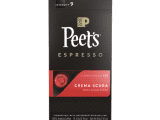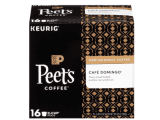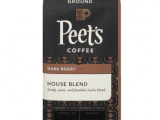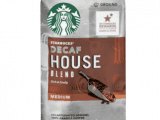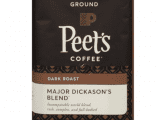Best Socially Conscious Coffee Companies
By Chris Ponzi
Here, Chris names his Coffee Company picks:
Best Socially Conscious Coffee Overall 2019 -- Larry's Coffee
Best for Coffee for Environmental Protection 2019 -- Larry's Coffee
Best Coffee for Women's Equality 2019 -- City Girl Coffee
Best Coffee for LGTBQ+ Equality 2019 -- Starbucks Coffee
Best Coffee for Gun Control 2019 -- Peet's Coffee and Tea
Best Coffee for Promoting a Just and Civil Society 2019 -- Larry's Coffee
Chris Ponzi is a writer, poet, environmentalist, and student of ecology dedicated to restoring and healing our natural world, inside and out.
Coffee gives us the delicious gift of consciousness in an otherwise sleep-anemic world. Coffee is the second largest international commodity in the world, second only to oil. As such, coffee has massive impact on all life on earth.
There are hundreds, if not thousands, of coffee companies in all shapes and sizes, and even more farms that cultivate and harvest the red coffee berry (yes, coffee starts as a red berry). The coffee industry is a complex blend of international models that partner with coffee farmers in origin countries mostly near the equator, to bring back the hand-picked, washed, and dried “green coffee bean” to major coffee consuming countries like the U.S., where they are then roasted and distributed for maximum freshness.
That black gold you’re sipping has had a long journey, my friends! With so many players in the bean game, coffee company ethics fall on a planetary-wide scale: from deplorable environmental and social practices that inspire tears, to the top of the range where Larry’s Coffee comfortably rests.
Opinions and information in this review are from the writer alone and not from SweetScore.
Views expressed are not necessarily those of SweetScore.
Best Overall - Larry's Coffee Company
What puts them at the top? Larry’s Coffee Company is headquartered in Raleigh, North Carolina and ethically sources certified organic coffee from fair trade cooperatives all over the world. A mid-sized coffee company, Larry’s wears a biodegradable sash of eco and socially responsible certifications that would make any scout proud: USDA Certified Organic, Certified B-Corp, Certified Fair Trade, Fair Trade Proof, Shade Grown Friendly to Birds, Cooperative Coffees, CRS Fair Trade, and Kosher Pareve (I recognize the validity of certifications is a more complex subject matter, but they can serve as at least a minimum evaluation standard for the consumer). I was impressed by their transparency as you can view their certification paperwork online amongst other price, pay, and documentation breakdowns.
Larry's earned these certifications through a pioneering blend of earth-friendly agricultural practices (which often just mean “traditional” practices), green-energy-designed and sustainable roasting facilities and operations, along with a “beyond fair-trade” social-economic model that genuinely supports farmers. They offer 15 creative blends and 15 single-origin blends (meaning they can be traced directly back to the farm where the coffee was grown), micro-lot coffees (which are very small farms–usually one or two families– noted for their extremely high coffee quality), water-processed decaffeinated options (a completely organic and non-chemical way to decaffeinate coffee), and “for a cause blends” where a percentage of their profits go to diverse environmental and social causes both in the U.S. and abroad. Their coffee quality also receives fist-bumps by both coffee elites and your everyday coffee lover alike, and while they aren’t the cheapest bean in the bag, they have very affordable price points given their quality.
There is an exciting emergence of socially and environmentally responsible coffee companies (so many it can give you a “paradox of choice” migraine), and many of the coffee companies I reviewed possessed some or many of these positive practices. I would like to highlight Java Planet Organic Coffee, Pachamama Coffee and Kickapoo Coffee for being close and worthy contenders on my list for the best– they also deserve your purchasing dollar. However, Larry’s Coffee stands out as being a true leader and boundary-pusher in the coffee world. They didn’t just follow the trends, they help start them, and they don’t show signs of ceasing to try and keep doing better in the future.
Best Coffee for the Environment - Larry’s Coffee Company
Most don’t know that coffee could soon become an endangered plant species, and given that coffee farms take up more than an estimated 27 million acres, we can just barely comprehend the devastation to life that comes with destructive environmental practices. All the more reason to support a truly eco-friendly coffee company. While there are many eco-progressive options, Larry’s Coffee leads the way with a solar-torch.
Beginning with the farms: all of Larry’s coffee is USDA certified organic, or transitional organic (meaning the coffee is organic but still in the process of receiving certification) and is shade-grown. Most of us understand organic at this point, but essentially it means that no chemical pesticides or fertilizers were used during the growing process. Non-organic farming utilizes chemicals that are toxic to the land, killing the “life” of the soil. It also pollutes the water supply, insects, animals, and humans. It’s not the silver-bullet to our food problems it is often claimed to be, but it is critical.
Shade-grown coffee is a lesser known concept, and basically means that the coffee plants are grown under a canopy of trees. In many coffee farm operations, trees are often cut down in order to plant more monoculture coffee plants in full sunlight to increase efficiency, which contributes to deforestation that increases carbon emissions, soil health and erosion, and destroys habitats for birds and other wildlife species. Without the help of nature’s natural shade protection, it also often indicates that more chemicals are utilized to keep the coffee crop healthy. Larry’s is shade-grown, which means more trees, a more natural coffee, more biodiversity and more habitat for wildlife.
Larry’s doesn’t stop at the farm though. Larry’s prides itself on their roasting facilities and operations that use green design, alternative energies, water conservation and rainwater harvesting, alternative fuels (veggie oil delivery bus!), composting and more. You can see the full spread on their facilities page. This goes above and beyond the vast majority of facilities I reviewed.
Java Planet, Pachamama Coffee, and Kickapoo Coffee also score highly on environmental. Java Planet is certified Organic, Fair Trade, Rainforest Alliance, and Bird Friendly (a high-standard certification created by the Smithsonian Migratory Bird Center for farms using a combination of foliage cover, tree height and biodiversity to provide quality habitat for birds and other wildlife). They were also a 2015 sustainable business award winner.Pachamama particularly impresses me with their biodiversity-enhancing 100% organic certified and shade grown-coffee (planting mixed-species trees and crops with the coffee plants, for example), and Kickapoo with their 95% certified organic coffee and 100% solar powered roastery, the first in the nation.
Best Coffee for Women's Equality and Reproductive Rights - City Girl Coffee
City Girl Coffee Co. in Duluth, Minnesota sources coffee from woman-owned or women-managed farms and cooperatives around the world, and a portion of every sale is given to support women-centered organizations within the coffee’s country of origin. It is also WBENC (The Women’s Business Enterprise National Council) certified, which is a certification that validates a business is at least 51 percent owned, controlled, operated and managed by a woman or women.
Sadly, in many countries where coffee is grown and sourced, there is still very high gender inequality, unequal distribution of income, social and even physical abuse. While women may work the land equally or even more than their male counterparts, they will often receive unequal equal pay, say, and treatment, and certainly not be allowed to make important decisions. This means that literally millions of women around the world can be supported with good coffee practices, and thus it’s so powerful to support brands like City Girl Coffee.
Their owner and founder, as well as most of their staff, are women, and you can get a glimpse into the women that manage and grow each coffee in their different source region, and how they are supporting women in the process on their website.
Their partners include the Café Feminino Foundation that seeks to“address the gender inequality, poverty and abuse that continue in many coffee producing regions throughout the world” and the International Women’s Coffee alliance, which is a global peer network of women in coffee that “advocates for women from seed to cup and provide access to resources and a forum for connection.”
They also have many coffee options that are both organic and fair-trade certified.
Shop Organic Artisanal Coffees
Best Coffee for LGBTQ+ Equality - Starbucks Coffee Company
Who hasn’t been to a Starbucks at least once in their life, or even once this week? Regardless of your feelings about the ubiquitous Seattle-founded coffee shop company, they have been a leader for the LGTBQ movement and community, which is why they ranked my “Best Coffee Company for LGBTQ Equality.”
Starbucks is a massive international Fortune 500 company, placing #5 on Fortune’s “World Most Admired Companies List,” and while it may be easy for some to demonize the ubiquitous coffee company based on its sheer size, what impresses me is that, in spite of that size, they have been a progressive leader on many social (and in many environmental categories) issues, a major one being LGBTQ.
First, Starbucks can pride themselves on scoring 100 out of 100 on the Human Right’s Campaign’s 2018 Corporate Equality Index. Second, even before gay marriage was legalized, the company provided same-sex couple health benefits. Since 2012, Starbucks’ employee health insurance offered coverage for gender surgeries, and in June 2018 they expanded that coverage to include even more transgender care. The company also highlights stories of some of its transgender employees (such as the first employee hired in 1998) on their website. Gender neutral bathrooms were introduced to its Washing D.C. stores in as early as 2010, and expanded their gender neutral signage to many stores across the country.
The company has been a supporter of marriage equality, including outspoken support and advocacy from longtime former CEO Howard Schultz. The company’s headquarters in Seattle also displays one of the biggest rainbow flags ever made.
In 2015, the company turned its Seattle stores into “LGBTQ Safe Spaces” where 2,000 Starbucks employees were trained in partnership with the police to help support LGBTQ victims of violence and provide their stores as a safe haven to the community. There are also other stores throughout the world like Durham in the U.K. that are following suit and becoming safe spaces.
Best Coffee for Gun Control - Peet's Coffee and Tea
Founded in the Bay Area, California, Peet’s Coffee & Tea is amongst the largest coffee companies in the U.S., and they were a contender for most categories on this list. Amongst their many deserving accolades for their environmental and socially responsible coffee programs (it roasts 100% of its coffee in the first LEED ® Gold-certified roasting facility in the nation and has been a long-time supporter of the LGBTQ movement), it wins here for its fairly strong stance on gun control, saying in 2010:
“While Peet’s Coffee & Tea respects and values all individuals’ rights under local, state and federal laws, our policy is not to allow customers carrying firearms in our stores or on our outdoor seating premises unless they are uniformed or identified law enforcement officers. Like most other private businesses, particularly retail establishments, we believe this policy is in the best interests of all of our customers, regardless of their personal beliefs.”
Peet's were chosen over Starbucks because, while Starbucks has “requested” that their customers not bring guns into their stores, they have not outlawed it, and so it is up to the individual gun owner to decide if they will enter a Starbucks with a gun, and they will not be asked to leave by Starbucks staff or management of that particular store if they do.
Best Coffee for Support of Just and Civil Society: Larry's Coffee
So first: what do we mean when we say “Just and Civil Society?” That’s a broad term, but in this context I define it to mean that the coffee company’s operations implement practices and policies that improve the social and economic livelihood of the people it employs, and ideally some percentage of its profits are dedicated to supporting worthy causes that contribute to the health and happiness of collective society.
The coffee business has a lot of consequences, and the World Bank estimates that more than 500 million peoples’ lives depend on coffee around the world, mostly small family farmers. Sadly, many farmers barely get paid a livable price for their coffee, while those that buy, roast, and distribute can make a bulky profit. This is why Larry’s Coffee, and companies like them, are so important.
Larry’s Coffee is Certified Fair Trade (essentially a certification that indicates they are paying an internationally set minimum price for coffee that is significantly better than most non-fair trade prices) and pays, according to their website, over $0.09/lb than the Fair Trade minimum. What sets them apart from other Fair Trade companies is that they helped to start FairTradeProof.org, an organization that, according to their site, “lets you see our entire document trail to prove our coffee beans are Fair Trade. We did this because the coffee industry is filled with companies that show photos of smiling farmers and use vague phrases like "farmer-friendly" without actually walking the walk. If a coffee company can't show you documents that track payments all the way to each individual farmer, then chances are that's not where the money's going.”
Beyond this, Larry's Beans™ is a founding member of Cooperative Coffees, the first and only cooperative of independent coffee roasters in the U.S. importing coffee directly (meaning they work directly with the farmers and not an intermediary buyer who may reduce farmer profits) from Fair Trade cooperatives. Cooperative business models are owned by the people who run them, and they are not beholden to shareholders or investors who may wish to not “do the right thing” with their people and the environment if it doesn’t help to increase profits. So you have farmer-owned cooperatives in the growing countries all the way to cooperative-owned roasters in the U.S. Once again, Larry’s leadership here deserves recognition.
As mentioned earlier, Larry’s Coffee also sells “for a cause” coffees that donate a percentage (5 to 10% on average) to specific social and environmentally positive organizations, both in the United States and abroad.
And finally, Larry’s Coffee is a certified B-Corporation. In order to be certified as a “B-Corp”, companies must pass a challenging assessment that evaluates: environmental and social performance; workers' rights, and corporate governance. This is just another in a long list of consistent actions that show the company’s dedicated commitment to a just and civil society, and not just a one-off for marketing purposes.
Shop Featured Coffees
How We Did Our Research
We believe it’s critical to be completely transparent about how we do our research here at SweetScore. First, I am an environmentalist, student of ecology, and certified permaculture designer that supports biodiversity and conservation projects here in Colombia where I live, including one biodiversity and conservation enhancing organic coffee farm. I have intimate hands-on experience of healthy growing practices (along with some first-hand knowledge of the business-side) and while I am not qualified as an “expert” in the coffee field, I have used my existing knowledge and education as a research foundation and evaluation tool for this article.
I have not personally visited these farms or roasting facilities, and so I have relied upon the company’s self-reported information on websites, their documentation trails and certifications, additional research sources mentioned below, customer information and insights, and in some cases the company’s representatives themselves whom I reached out to.
I spent over 15 hours researching well-over fifty coffee companies that fit under certain criteria of being at least “organic and fair trade.” Beyond the brands I already knew, I researched coffee companies on trusted "green and environmental" websites (also below) I follow to get a list of notable brands in this space and why they were considered. I then followed up with an advanced google search. Based on this initial research assessment, I then went on to Amazon and other coffee purchasing sites to see their collective product offerings and customer reviews. I only chose brands that had at least a decent selection of coffee to choose from and that were also highly rated by customers for their quality. For my short list, I then reviewed what coffee experts said and how they rated the coffee based on quality and taste.
With my finalists, I then directly contacted the companies and asked them to fill out a detailed questionnaire that reviewed their environmental policies as well as their social policies in the categories listed above. While nearly two dozen messages went out, nine replied (on this list, Pachamama and Kickapoo both filled out their questionnaires, and while I had communicated with both Larry’s and CityGirl Coffee on e-mail and phone, they did not provide any insight or comment. Peet’s and Starbucks, after multiple attempts, also did not comment on the pieces).
Once my decisions had been made in each category, the companies were then collectively evaluated and vetted by the knowledgeable SweetScore staff, who provided their own insights, research, and feedback.
Honorable Mentions List
All of these companies show leadership in various ways on the issues we cover, and deserve credit for their ethical and socially consious contributions.
Kicking Horse Coffee Company
Kicking Horse Coffee Company is Canadian-based, now owned primarily by Italian Lavazza coffee company, is in the top three organic and fair-trade roasters in Canada.The company is very popular with coffee drinkers in North America as well. As mentioned, the company’s coffee is both fair trade, organic, and they support a wide variety of environmental and social causes.They also refuse to provide single-serve coffee as it is currently not environmentally friendly, despite the profits they are undoubtedly losing in that market. I reached out to them and they expressed a willingness to receive our questionnaire, but I did not receive it by the publication of this article.
Tiny Footprint Coffee
Tiny Footprint Coffee Company is the world’s first “carbon negative” coffee company. When you buy their coffee, they donate funds to the nonprofit Mindo Cloudforest Foundation that then funds reforestation in Ecuador’s Mindo cloud forest. So if you buy their coffee, they plant trees to offset the emissions. I reached out to them and received no response.
Don Pablo Coffee
Don Pablo's Subtle Earth Organic Coffee is very well-reviewed by its coffee drinkers and their use of traditional and holistic agriculture practices is very healthy in my estimation. They also kindly responded to our questionnaire.
Death Wish Coffee
Boasting over 17,000 mostly very positive Amazon Customer reviews, this Fair Trade and USDA Organic Certified coffee bills itself as the “World’s Strongest Coffee.”
Keurig Green Mountain
The big name in the K-Cup single-serve coffee movement. It’s hard to justify the environmental friendliness of the single-serve K-cups, however, the company does seem to be doing what it can within this movement. I reached out to them, and received no response.
Equator
The first coffee roaster in California to become a certified B-corporation. They also support a wide diversity of projects like farmer micro loans, World Bicycle Relief, supporting women’s land rights in Nicaragua, girl and female empowerment in Zimbabwe, and protecting Sumatran tigers. I reached out to them, and received no response.
Ethical Bean
Certified Fair Trade, USDA Organic, Organic Biologique (Canadian Organic), and Certified B-Corporation. Their roasting facilities are built to LEED standards and and they were one of the first companies to introduce 100% compostable single serve pods. I reached out to them, and received no response.
Stumptown
A very popular coffee company, they support Earth University in their coffee source country of Guatemala. Their coffee lacks the certifications and outright healthy practices of our other companies, and they declined to answer our questionnaire.
Juan Valdez
It wouldn’t be right not to not comment on the iconic Juan Valdez coffee company. The mustachioed farmer is probably the most internationally recognizable coffee icon and brought the quality of Colombian coffee to the world. They are in some respects, the Starbucks of coffee in Colombia. They have organic options and they provide a lot of farmers here in Colombia with a living wage for their coffee, however, some farmers report that it is, in many cases, barely a living wage for the independent small family farmers.
Shop Featured Coffees
Ethical Mom
Put Your Wallet Where Your Heart Is
